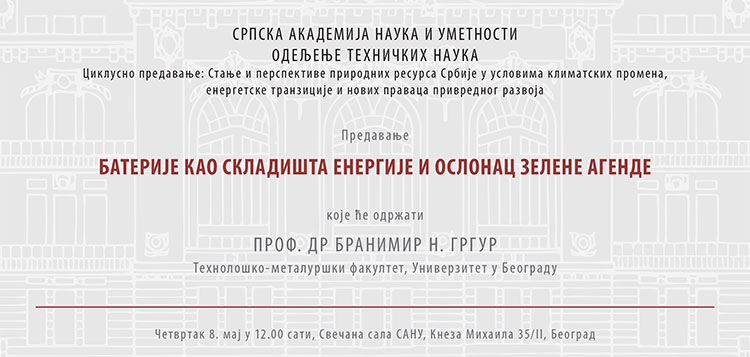Lecture ’Batteries as Energy Storage and the Support of the Green Agenda’ by Professor Branimir N. Grgur
As part of the lecture series ’Current State and Perspectives of Natural Resources of Serbia in the Era of Climate Change, Energy Transition and New Directions of Economic Development’, Professor Branimir N. Grgur, PhD, will give a lecture titled ’Batteries as Energy Storage and the Support of the Green Agenda’ on Thursday, 8 May, at noon at the SASA Grand Hall.
Lithium-based electrochemical energy sources, lithium-ion batteries, are the most widespread today and are used in a wide range of applications, from portable electronic devices, electric cars, and other transporters to electrical energy storage systems. Due to the low prevalence of lithium and the use of strategic raw materials, the lecture will be dedicated to carbon dioxide emissions and energy consumption during technological processes of obtaining and processing lithium compounds and other metals from various sources, the production of battery components, positive and negative electrodes, electrolytes, and the production of cells and storage batteries. The issue of the safety of these systems during exploitation will also be discussed. Finally, carbon dioxide emissions from a potential lithium mine in the Jadra Valley and energy consumption and carbon dioxide emissions for the hypothetical production of electric cars in the Republic of Serbia will be presented.
Branimir N. Grgur has served as an associate professor at the Faculty of Technology and Metallurgy, University of Belgrade, at the Department for Physical Chemistry and Electrochemistry since 2010. He obtained his doctoral degree in 1999 in chemical engineering, in the subfield of electrochemical engineering. Between 1996 and 1998, he completed specialist training at the Lawrence Berkeley National Laboratory (USA), followed by postdoctoral studies in 2000. With over 30 years of experience in higher education, Professor Grgur has taught a range of courses, including Electrochemistry, Renewable Energy Resources and Electrochemical Energy, Electrocatalysis, and Corrosion and Protection. He has authored more than 140 SCI-indexed papers, accumulating over 6,200 citations (h-index = 37), along with 47 papers in national journals, two monographs, five book chapters, and three university textbooks. He was the leader of two national projects and a participant in five international collaborations. His scientific excellence has been recognised with 26 awards and honours—19 domestic and 7 international. Since 2019, he has consistently been included on Stanford University’s list of the world’s most influential researchers. In 2018, he was elected a corresponding member of the Academy of Engineering Sciences of Serbia. His main areas of interest are electrocatalysis, energy conversion and storage, corrosion and protection.

